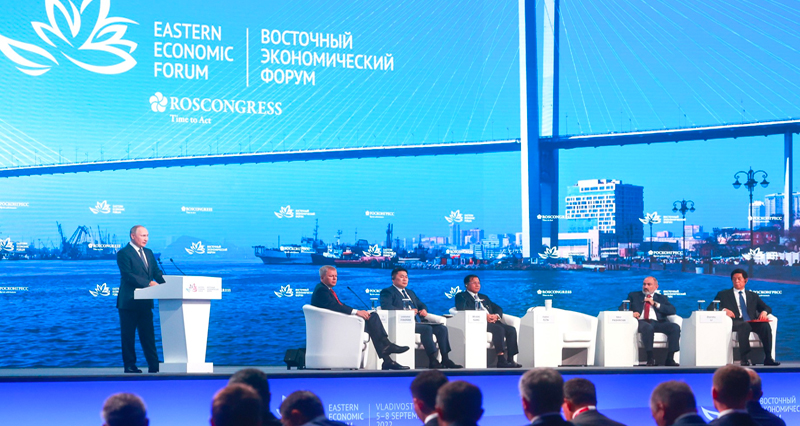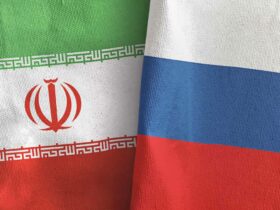By Işıkgün Akfırat, Vladivostok, Russia
The Eastern Economic Forum in Vladivostok, Russia’s easternmost city, witnessed China-Russia-India unity. Speaking at the Presidential Session, Li Zhanshu, second leader of the People’s Republic of China’s after the President Xi Jinping, said that Asian countries would lead humanity out of the current challenges.
The 7th Eastern Economic Forum (EEF), which took place in Russia’s eastern central city Vladivostok on September 5-8, provided a panorama of an “Asian Age” as well as a multipolar world. After President Vladimir Putin, Li Zhanshu, the second leader of the People’s Republic of China’s after the President Xi Jinping, spoke at the Presidential Session on the third day of the meeting. Expressing his agreement with Putin’s emphasis on a multipolar world, Li said that “Asian countries are destined to play a historic role”. Indian Prime Minister Narendra Modi sent a video message to the forum. Thus, the Russia-China-India axis that frightens the Atlantic countries was once more formed in Vladivostok, albeit with digital means.
‘What did Obama do to preserve peace to get the Nobel Prize?
Putin also commented for the first time on Obama’s Nobel Peace Prize. Responding to a question by the moderator of the session, Ilya Doronov, about the revocation of the press license of Novaya Gazeta, run by a Russian Nobel Prize winner, Putin said that Nobel Prizes, especially those given in the humanitarian field, have lost their reputation.
Putin said the following: “I worked with President Obama, and despite differences of opinion, I always treated my American counterparts with respect. But why was Obama awarded with the Nobel Peace Prize? I did not talk about it before, but you are pushing me to ask: What did President Obama do to preserve peace? I’m talking about the conflicts that were going on in different parts of the world while he was in office.”
Borrell’s indiscretion and the reference to Franco
Host Ilya Doronov continued to ask “provocative” questions that made viewers smile. Speaking about the situation at the Zaporizhia Nuclear Power Plant, Doronov brought up European Union High Representative for Foreign Affairs Josep Borrell’s remarks about Russia as a “fascist regime”. Putin first said, “How does this remark relate to Zaporizhia?” Then he said, “He is babbling again, he is an expert on this.”
Reminding that Borrell is Spanish, Putin said, “If he had lived in 1930s Spain and heard the words ‘a cloudless sky over Spain’, which was the coded message of General Franco’s coup, he would have taken up arms.”
“But which side would he be on? The democratically elected leftist government or the coup plotters?” asked Putin, “My opinion is that he would have sided with the coup plotters. Because today he supports the same kind of coup plotters in Ukraine.” He reminded that the current Ukrainian government is based on the coup in 2014. Emphasizing that Borrell defends both the Maidan coup and the Neonazis protected by the state, Putin said, “I think it is understood who is on the side of the fascists.”
‘The sanctions of the US and its satellites could not make the Russian economy kneel’
The second most anticipated speaker at the Presidential Debate was Li Zhanshu, the President of China’s National People’s Congress. Li, who as the head of China’s legislature is second only to Xi Jinping in the state protocol, began his speech by praising the resilience of the Russian economy in the face of sanctions.
“Under Putin’s leadership, the Russian economy has survived despite the harsh sanctions imposed by the US and its satellites,” Li said, adding that the Russian economy has recovered its losses in a very short period of time. He added that inflation expectations came down, civilian consumption and employment recovered, and corporate activities stabilized.
Stating that China sees Russia as a very important partner, “We will continue to cooperate with Russia in trade, finance, technology, science, education and culture,” Li said, defying Western propaganda. He also expressed China’s willingness to support the development of the Far East region, which Russia attaches strategic importance to. He emphasized that China’s northeastern region and the Russian Far East will develop together.
Multipolar world cannot be reversed
“He summarized the current situation in the world very well,” Li said, praising the Russian president’s speech, agreeing with Putin’s main emphasis at the St. Petersburg and Vladivostok forums, stressing that the multipolar world is an “irreversible trend” and responds to the aspirations of humanity. “Our world is undergoing profound and turbulent transformations,” Li said of what Putin called a “tectonic shift.”
Noting that some countries still form narrow blocs, fuel conflicts and resort to unilateral actions, Li said the zero-sum game approach and Cold War mentality should be abandoned. “Multipolarity and genuine multilateralism is the only way to take humanity forward,” he said.
‘We will integrate the Eurasian Economic Union with the Belt and Road’
Reminding that the two countries signed comprehensive cooperation agreements under the leadership of Presidents Xi Jinping and Vladimir Putin in February this year, Li said that they are working hard to implement this partnership program. Li also called for the integration of the China-led Belt and Road Initiative and the Russia-led Eurasian Economic Union. “There are no limits to our cooperation,” the Xi-Putin joint statement declared, referring to the goal of a “Greater Eurasian Partnership.”
Li also embraced the concept of “indivisibility of security”, which Putin has repeatedly referred to. “The security of one country cannot be at the expense of others,” Li said, adding that China’s contribution to maintaining peace will also be based on the same concept. He noted that the Global Security Initiative announced by President Xi Jinping last year was founded on this concept and has received wide support in a short period of time.
Saving humanity is Asia’s common destiny
Li’s call for partnership among the rising Asian countries was striking:
“Each Asian country is unique but also mutually complementary. Asian countries are destined to play a historical role and revitalize the world economy.” Li also underlined that “development policies and strategies need to be integrated and harmonized” to realize Asia’s great potential. He spoke of the need to create a “more sustainable and free environment” for trade and investment by putting forward joint projects. He also said that steps taken on this basis would provide a new impetus for the mutually beneficial “political globalization” that China offers as an alternative to neoliberal globalization.
Noting that the Chinese Communist Party will hold its General Assembly on October 16, Li said that this meeting will “herald the new era of China’s socialist modernization.” He added that China’s progress on this path would contribute to the modernization of humanity.
Li concluded his remarks by emphasizing: “China resolutely supports and advances multipolarity all over the world. We are ready to work with all countries that adhere to the principles and purposes of the United Nations Charter and uphold the principles of a world order based on rationality and justice. We will build a society based on the common future of the humankind together.”
India committed to strategic partnership with Russia
Indian Prime Minister Narendra Modi, in a video message beginning with “Namaskar!” (Indian greeting), underlined the “Special and Privileged Strategic Partnership” between Russia and India. Noting that India was the first country to open a consulate in Vladivostok, Modi said that cooperation in development with the Russian Far East is one of the pillars of the strategic partnership between the two countries.
Describing the Vladivostok Eastern Economic Forum as a great global platform for cooperation for the development of the region, Modi appreciated and congratulated Putin’s vision. He said that linking the North-South Corridor, the Chennai-Vladivostok Sea Corridor and the Northern Sea Route would play a major role in enhancing cooperation. He expressed India’s wish to strengthen cooperation with Russia in the Arctic region, which is growing in strategic importance along with rapidly expanding trade in energy, iron and steel industry and other fields.
Stating that events in one part of the world affect the whole of humanity as described in the ancient Indian teaching “Vasudhaiva Kutumbakam” (The World is One Family), Modi pointed out that the Ukraine conflict and the Covid-19 pandemic have created serious challenges, especially for the developing world countries. He drew attention to the shortage of grain, fertilizer and fuel. Stating that India is in favor of a solution through diplomacy and dialogue, Modi said that they welcome the recent grain agreement signed under the mediation of Türkiye.
Pashinyan also emphasized the ‘opportunities’
One of the speakers at the Presidential Session was Armenian Prime Minister Nikol Pashinyan. Pashinyan said that Armenia’s normalizing its relations with Türkiye and Azerbaijan is in the interest of the region and his country. He said that Armenia’s strategic partner Russia’s close partnership with both countries creates opportunities for the normalization process.
Pashinyan said that the trilateral working group formed by Armenia, Azerbaijan and Russia is working to activate all avenues in the region, adding that progress is being made, although the final stage has not yet been reached. Pashinyan said that he agrees that crises create opportunities, adding that Armenia is located at the intersection of the North-South Corridor and should turn this position into an opportunity. He emphasized that the road to be opened between Armenia and Azerbaijan would mean “the opening of new international trade routes”.
“This project is of great importance not only for the countries of the region, Armenia, Iran, Azerbaijan, Georgia, Türkiye, but also for the Russian Federation, Far Eastern countries, Eastern countries in general, African countries and Middle Eastern countries,” Pashinyan added.
Li‘s support for Russia causes unease in the West
Chinese National Assembly Speaker Li Zhanshu held a meeting with Vladimir Putin on the sidelines of the Forum. “Political trust, strategic coordination and pragmatic cooperation between the two countries have reached new heights,” Li said, calling China and Russia “stronger than ever” thanks to the “strategic wisdom” of Xi and Putin.
Li also traveled to Moscow and held delegation meetings with State Duma Speaker Viacheslav Volodin and Federation Council Secretary Valentina Matviyenko.
In the information note published on the Duma’s website, Li was quoted as supporting Russia’s military operation in Ukraine with the following words: “We see that the US and its NATO allies are seriously threatening Russia’s national security and the lives of Russian citizens by expanding their presence near Russia’s borders. We fully understand and support the necessity of the measures taken by Russia to protect its fundamental interests.”
The New York Times newspaper did not overlook these remarks. In an article published the previous day, these words were presented as “China’s highest level of support for Russia’s invasion of Ukraine”.

















Leave a Reply